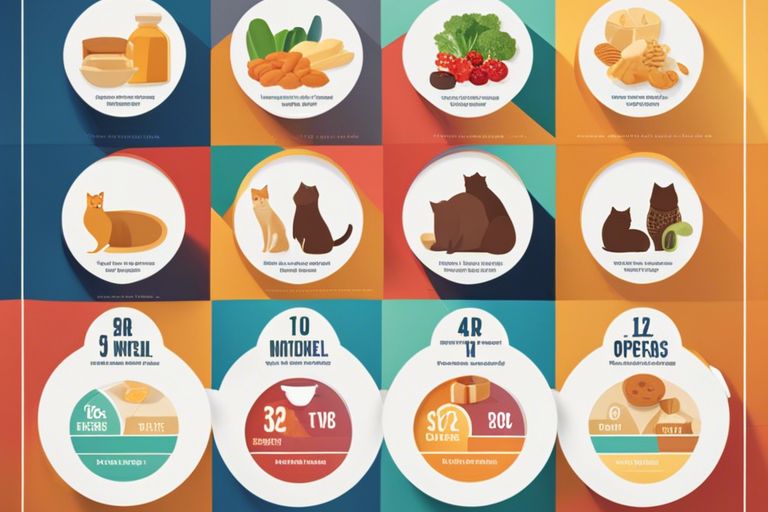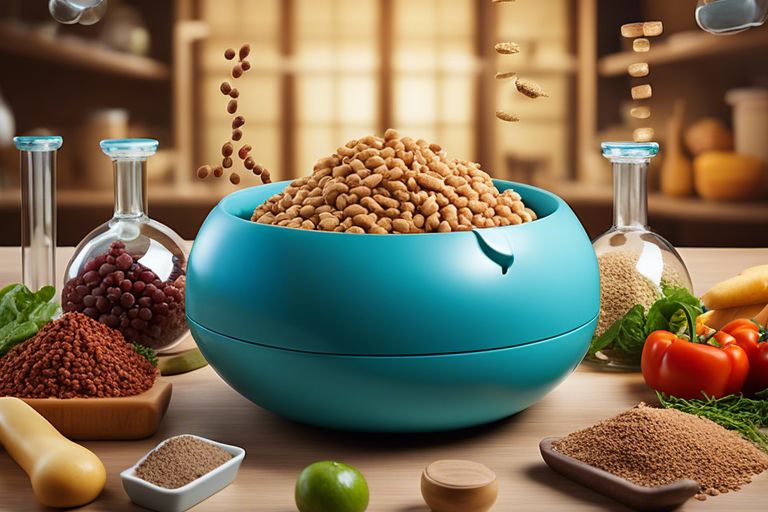In today’s market, pet owners are faced with a plethora of choices when it comes to selecting the best food for their furry companions. However, not all pet foods are created equal, and it’s important to prioritize nutrient-rich options that will support the overall health and well-being of your pet. To help you navigate through the options, we have compiled a list of the top 10 nutrient-rich pet foods that are specifically formulated to provide optimal health benefits for your beloved pets.
Choosing the right pet food can have a significant impact on your pet’s overall health and longevity. With so many options available, it can be overwhelming to determine which pet foods truly deliver the essential nutrients your pet needs. Our list of the top 10 nutrient-rich pet foods will provide you with a clear and concise guide to the best options on the market, ensuring that your pet receives the highest quality nutrition for optimal health and well-being.
Key Takeaways:
- Quality ingredients: Look for pet foods with high-quality, real meat as the first ingredient, and avoid fillers like corn and by-products.
- Complete and balanced nutrition: Ensure the pet food meets AAFCO (Association of American Feed Control Officials) standards for complete and balanced nutrition.
- Rich in essential nutrients: Choose pet foods with a good balance of protein, healthy fats, vitamins, and minerals to support your pet’s overall health.
- Fiber content: Consider pet foods with adequate fiber content to support digestive health and prevent constipation.
- Omega-3 fatty acids: Look for pet foods that contain omega-3 fatty acids, which can benefit your pet’s skin, coat, and overall immune system.
- No artificial additives: Avoid pet foods with artificial colors, flavors, and preservatives, as these may have potential health risks for your pet.
- Individual pet needs: Consider your pet’s specific needs, such as age, breed, activity level, and any health concerns, when choosing a nutrient-rich pet food.
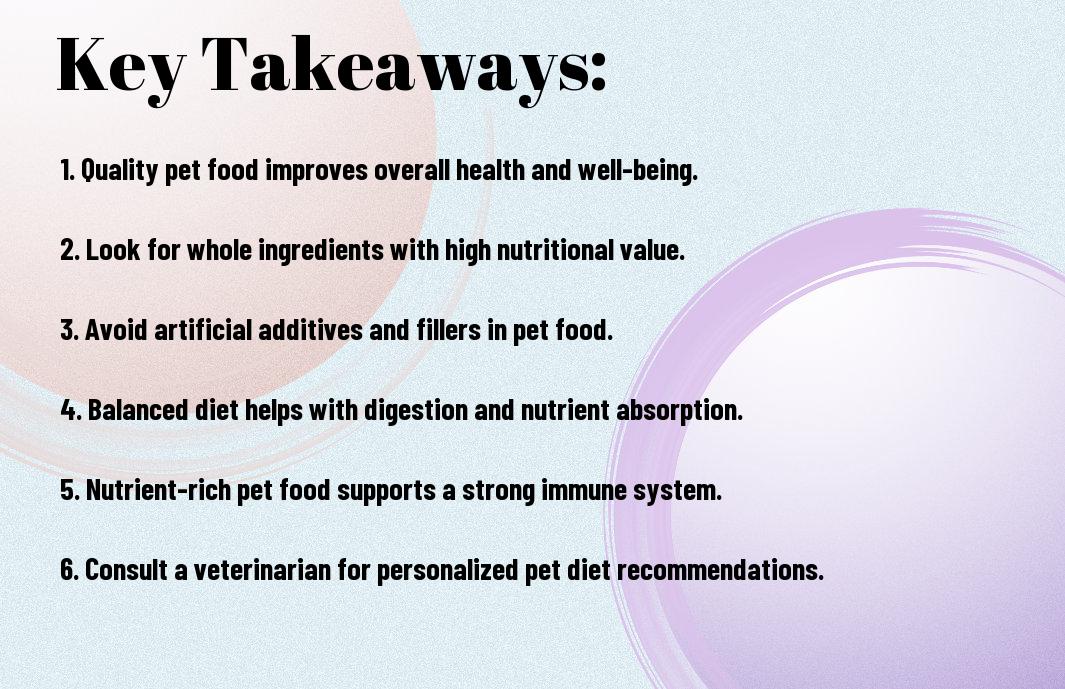
Understanding Pet Nutrition
While many pet owners understand the importance of providing their pets with a balanced diet, the world of pet nutrition can be complex and overwhelming. Understanding the specific nutritional needs of your pets is essential in ensuring their overall health and wellbeing.
For cats and dogs, a nutrient-rich diet is crucial for maintaining healthy body functions, energy levels, and a strong immune system. By providing a complete and balanced diet, pet owners can help their furry friends thrive and live a long, happy life.
Essential Nutrients for Cats and Dogs
For cats and dogs, essential nutrients include protein, carbohydrates, fats, vitamins, and minerals. Protein is particularly important for the growth and repair of tissues, while carbohydrates and fats serve as a source of energy. Vitamins and minerals play a crucial role in various bodily functions and contribute to overall health and wellness.
In addition to these macronutrients, cats and dogs also require specific amino acids and fatty acids for optimal health. These nutrients play a key role in supporting their immune system, maintaining healthy skin and coat, and promoting overall wellbeing.
Common Nutritional Deficiencies
Cats and dogs can experience nutritional deficiencies if they are not provided with a balanced and complete diet. Common deficiencies include lack of essential vitamins and minerals, such as vitamin D, calcium, and taurine for cats, and vitamin A, calcium, and omega-3 fatty acids for dogs.
To ensure that your pets receive adequate nutrition, it is important to feed them high-quality, nutrient-rich pet foods that are specifically formulated to meet their individual needs. By providing a balanced diet, pet owners can help prevent nutritional deficiencies and promote optimal health for their beloved pets.
Reviewing Commercial Pet Food Standards
Despite the wide variety of commercial pet foods available on the market, there are specific standards and regulations in place to ensure the quality and safety of these products. Understanding these standards and regulations is essential for pet owners who want to make informed decisions about the food they feed their furry friends.
Regulatory Bodies and Quality Control
For the United States, the Association of American Feed Control Officials (AAFCO) is the primary regulatory body that sets standards for pet food labeling and ingredient requirements. In addition, the Food and Drug Administration (FDA) and the United States Department of Agriculture (USDA) also play a crucial role in ensuring the safety and quality of pet food through inspections and enforcement of regulations.
It’s important for pet owners to look for pet foods that meet AAFCO nutritional adequacy standards and have undergone rigorous testing to ensure that they provide complete and balanced nutrition for their pets. Additionally, pet food manufacturers should adhere to strict quality control measures to ensure the safety and consistency of their products.
Deciphering Pet Food Labels and Ingredient Lists
Control Knowing how to decipher pet food labels and ingredient lists is essential for pet owners who want to make informed choices about their pet’s nutrition. The ingredient list is a valuable tool for identifying the key components of a pet food, while the guaranteed analysis and nutritional adequacy statement provide information on the product’s nutritional content and suitability for specific life stages. It’s important for pet owners to understand common pet food ingredients and the nutritional benefits they offer, as well as to be wary of vague or misleading labeling practices that may not accurately reflect the quality of the product.
Lists By carefully reading and understanding pet food labels and ingredient lists, pet owners can make informed decisions about the nutritional value and quality of the pet foods they choose for their furry companions. Familiarizing oneself with common pet food ingredients and recognizing potential red flags in labeling practices can help pet owners select nutrient-rich pet foods that promote optimal health for their pets.
Top Pet Foods for Dogs
After conducting thorough research and consulting with veterinarians, we have compiled a list of the top 10 nutrient-rich pet foods for optimal health. When it comes to providing the best nutrition for your canine companion, it’s important to consider their specific dietary needs and preferences.
Dry Kibble Selections
Kibble is a popular choice for dog owners due to its convenience and affordability. Look for high-quality dry kibble options that are packed with protein, essential vitamins and minerals, and healthy fats. Brands that use real meat as the first ingredient and avoid fillers and artificial additives are ideal for maintaining optimal health for your dog.
Canned and Wet Foods
Canned and wet foods can be a great option for dogs that prefer a softer texture or for those with dental issues. Look for options that are made with high-quality protein sources, such as chicken, beef, or fish, and are free from fillers and artificial preservatives. These foods can provide additional hydration for your dog and offer a convenient alternative to dry kibble.
The right canned and wet foods can offer a balanced meal for your dog, providing essential nutrients and promoting overall health and well-being. It’s important to carefully read the labels and choose options that are free from additives and low-quality fillers.
Raw and Alternative Diet Options
To provide a more natural and nutrient-dense diet for your dog, consider raw and alternative diet options. These may include raw food diets, freeze-dried options, or dehydrated meals. These options often contain a higher protein content, essential enzymes, and beneficial probiotics for optimal digestive health.
It is important to consult with a veterinarian or pet nutritionist before transitioning your dog to a raw or alternative diet. When done properly, these options can provide a range of health benefits, including increased energy levels, improved digestion, and a shinier coat.
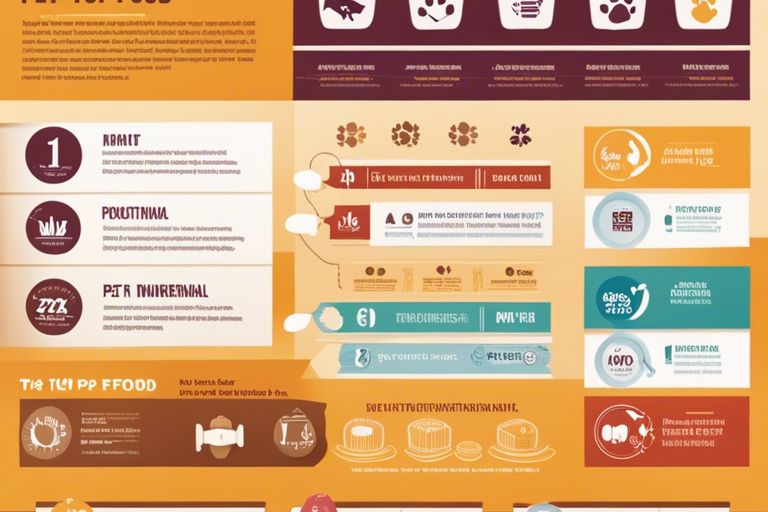
Top Pet Foods for Cats
Now let’s take a look at some of the top nutrient-rich pet foods specifically designed for cats. Whether you have a kitten or a senior feline, providing them with the best nutrition is essential for their overall health and well-being.
Specialized Feline Dry Foods
Specialized feline dry foods are formulated to meet the unique nutritional needs of cats. These foods are packed with essential nutrients such as protein, vitamins, and minerals to support feline health. Look for brands that specifically cater to different life stages and any specific dietary requirements your cat may have.
Wet Foods and Broths for Cats
Foods like wet cat food and broths can provide much-needed hydration in addition to essential nutrients. These options can be beneficial for cats who may not drink enough water on their own. Many wet foods and broths are also available in a variety of flavors to cater to even the pickiest of feline palates.
The inclusion of high-quality proteins, such as chicken or fish, can provide an additional source of essential amino acids and omega-3 fatty acids, which are crucial for feline health.
Raw Diets and Treats for Feline Health
Cats can also benefit from raw diets and treats that are specifically formulated for their dietary needs. These options often feature minimal processing and can be an excellent source of important nutrients for feline health. Look for raw diets and treats that are complete and balanced to ensure your cat receives all the necessary nutrients for optimal health.
For instance, some raw diets and treats may include ingredients like organ meats, which are rich in essential vitamins and minerals. These options can provide a natural and biologically appropriate diet for cats, supporting their overall health and well-being.
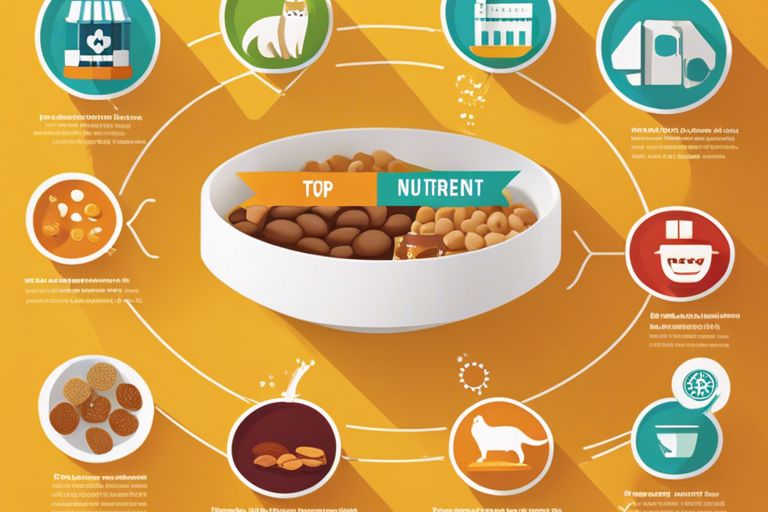
Special Considerations for Pet Food
To ensure the optimal health and well-being of your pet, it’s important to consider any special dietary needs or health issues they may have. By selecting the right pet food that addresses these considerations, you can help support your pet’s overall health and vitality.
Foods for Pets with Health Issues
On occasions when your pet is dealing with health issues such as diabetes, kidney disease, or digestive disorders, it’s crucial to select pet food that is specifically formulated to support their unique needs. Look for products that are low in carbohydrates, high in protein, and contain added nutrients to aid in their recovery and overall health.
Additionally, some pets may require specialized prescription diets prescribed by their veterinarian. These diets are specifically designed to meet the nutritional needs of pets with certain medical conditions, and should be used under the guidance of a veterinary professional. Always consult with your veterinarian to determine the most appropriate diet for your pet’s specific health concerns.
Allergen-free and Limited Ingredient Diets
To ensure the well-being of pets with food sensitivities or allergies, consider opting for allergen-free or limited ingredient diets. These specialized pet foods are crafted to minimize the risk of triggering allergic reactions or sensitivities, while still providing essential nutrients for a balanced diet. Look for options that are free of common allergens such as wheat, corn, soy, and artificial additives, and contain high-quality, easily digestible ingredients.
With the growing prevalence of food allergies and intolerances in pets, it’s important to carefully assess your pet’s dietary needs and select pet foods that align with their specific sensitivities. By prioritizing allergen-free and limited ingredient diets, you can help minimize the risk of adverse reactions and support your pet’s overall health and well-being.
Integrating Supplements and Complementary Foods
Unlike standard pet foods, supplements and complementary foods play a vital role in providing additional nutrients and enhancing the overall health of your pet. These additions can help address specific nutritional deficiencies and support your pet’s overall well-being.
Benefits of Dietary Supplements for Pets
The addition of dietary supplements to your pet’s diet can offer a range of benefits. These supplements can help support joint health, improve skin and coat condition, and provide essential vitamins and minerals that may be lacking in commercial pet foods. Furthermore, certain supplements can aid in the management of specific health conditions, such as digestive issues or allergies, providing targeted support for your pet’s individual needs.
Incorporating Fresh Foods and Homemade Options
Fresh and homemade foods can offer various benefits for your pet’s diet. Fresh foods, such as lean meats and vegetables, can provide natural sources of vital nutrients and offer a welcome change from processed pet foods. Homemade options also allow you to have more control over the ingredients and quality of your pet’s diet, ensuring that they receive the best possible nutrition.
With the increasing interest in natural and holistic approaches to pet nutrition, many pet owners are turning to homemade diets and fresh food options to provide their pets with a well-rounded and nutritious diet. These alternatives can offer a greater variety and quality of nutrients, catering to your pet’s specific dietary needs and preferences.
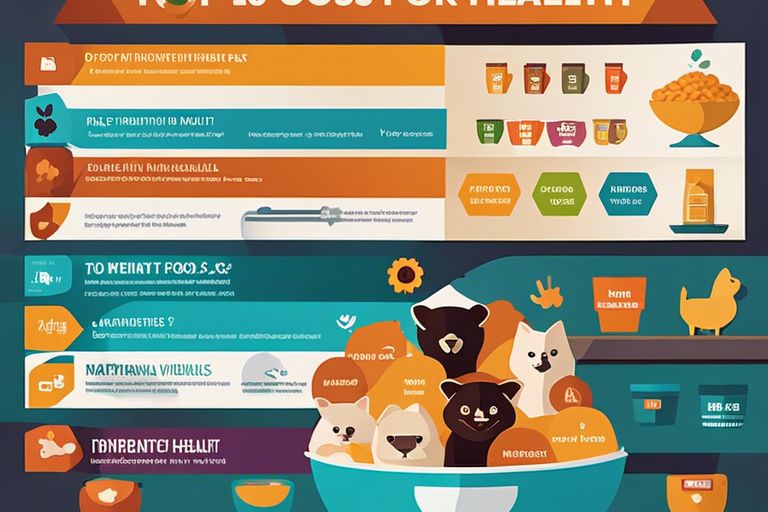
Conclusion
Taking this into account, it is clear that providing our pets with nutrient-rich foods is essential for their overall health and well-being. The top 10 pet foods listed in this article offer a wide range of benefits, including high-quality protein sources, essential vitamins and minerals, and natural ingredients that support optimal health. By choosing one of these nutrient-rich pet foods, pet owners can ensure that their furry friends receive the proper nutrition they need to thrive.
For more information on the best pet foods for optimal nutrition and health, you can read the full article Top 10 Best Dog Foods for Optimal Nutrition and Health. Make sure to consult with a veterinarian to determine the best diet for your pet’s individual needs.
FAQ
Q: What are nutrient-rich pet foods?
A: Nutrient-rich pet foods are formulated to provide a well-balanced diet that meets the nutritional needs of pets for optimal health and well-being. These foods are packed with essential vitamins, minerals, and other nutrients to support a pet’s overall health.
Q: Why are nutrient-rich pet foods important for pets?
A: Nutrient-rich pet foods are important because they provide the necessary nutrients that pets need to thrive. These foods can help support a pet’s immune system, promote healthy digestion, maintain a shiny coat, and more.
Q: What are the top 10 nutrient-rich pet foods for optimal health?
A: The top 10 nutrient-rich pet foods for optimal health include brands like Orijen, Acana, Taste of the Wild, Wellness CORE, Blue Buffalo, Merrick, Natural Balance, Instinct, Canidae, and Solid Gold. These brands offer high-quality ingredients and complete and balanced nutrition for pets.
Q: How do I choose the right nutrient-rich pet food for my pet?
A: When choosing a nutrient-rich pet food for your pet, consider your pet’s age, size, breed, and any specific dietary needs. Look for foods with high-quality, natural ingredients and complete and balanced nutrition, and consult with your veterinarian for personalized recommendations.
Q: Are there specific nutrient requirements for different types of pets?
A: Yes, different types of pets have varying nutrient requirements based on their species, breed, and life stage. For example, dogs and cats have different nutritional needs, and senior pets may require different nutrients compared to younger pets. It’s important to choose a pet food that meets these specific requirements.
Q: Can nutrient-rich pet foods help with specific health issues in pets?
A: Yes, nutrient-rich pet foods can be beneficial for addressing specific health issues in pets. For example, foods formulated for joint health can support dogs with arthritis, while those designed for weight management can help overweight pets. Always consult with a veterinarian for personalized advice on addressing specific health issues.
Q: Are there any precautions to consider when switching to a nutrient-rich pet food?
A: When switching to a new nutrient-rich pet food, it’s important to transition gradually to prevent digestive upset. Mix a small amount of the new food with the old food and gradually increase the new food over about a week. Monitor your pet for any signs of allergies or intolerance and consult with your veterinarian if needed.
